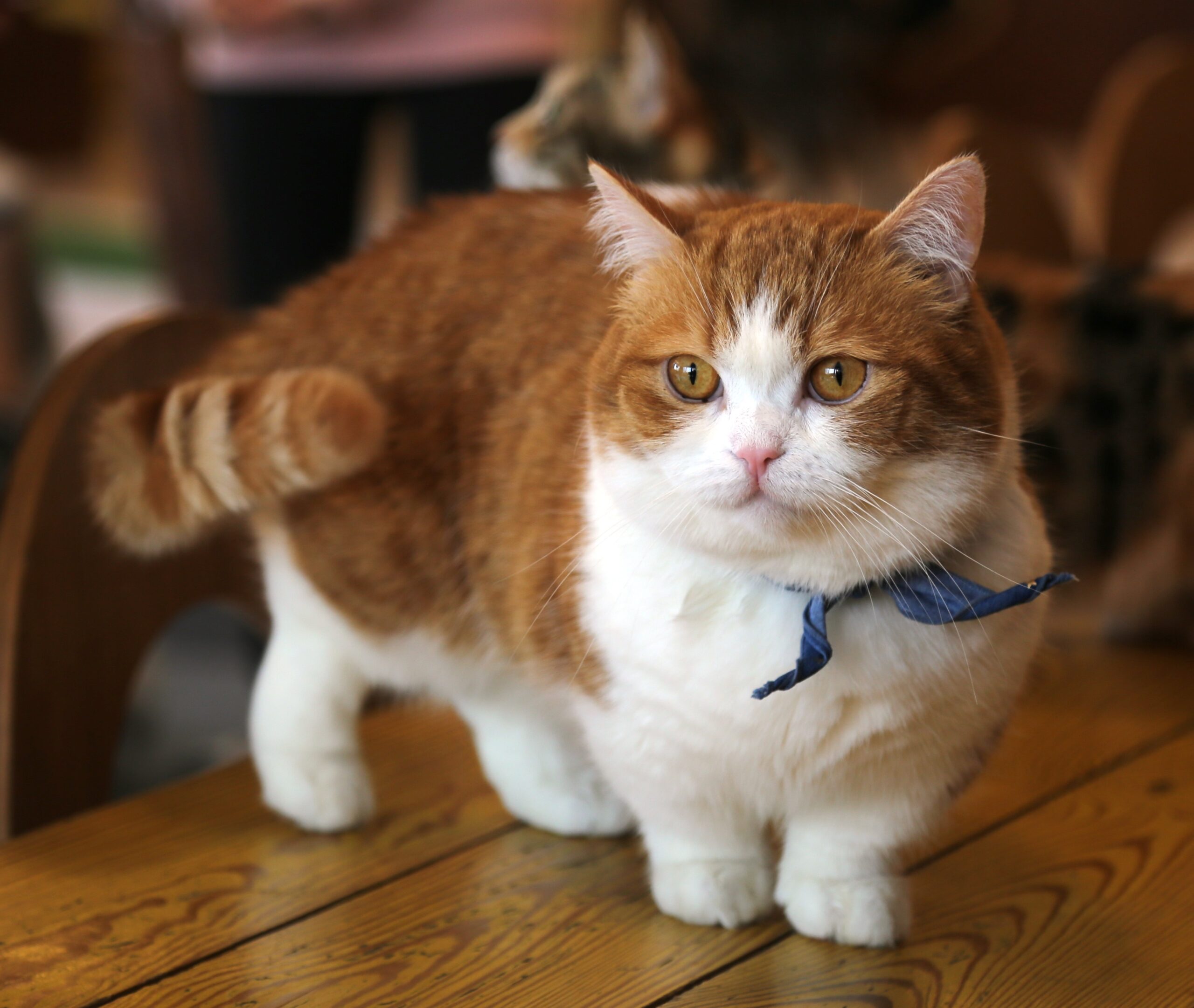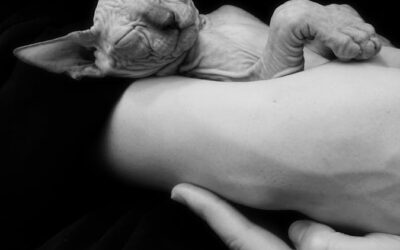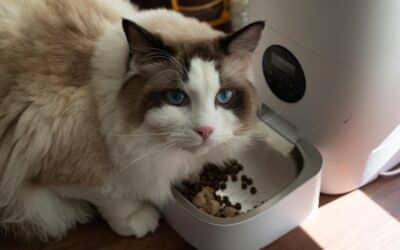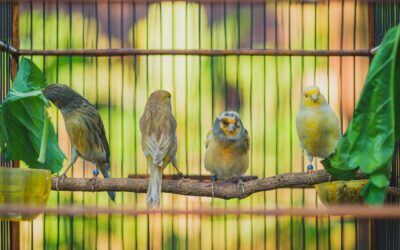DISCLAIMER: KATE’S K9 PET CARE PROUDLY PROVIDES DOG WALKING, CAT SITTING, SMALL ANIMAL PET CARE, PET TAXI SERVICES, “ALMOST OVERNIGHT” PET CARE, AND CONVENIENT PET SUPPLY DELIVERY. FOR FULL DETAILS ABOUT EACH OF OUR SERVICES, PLEASE VISIT OUR SERVICE PAGES TO LEARN MORE ABOUT HOW WE CAN SUPPORT YOUR PET’S NEEDS. TO SEE WHERE WE CURRENTLY OPERATE, PLEASE VISIT OUR SERVICE AREA PAGE.
Munchkin kittens capture hearts with their adorable short legs and playful personalities. These unique felines require specific care considerations that differ from other cat breeds, making proper knowledge essential for new owners.
The Munchkin breed emerged from a genetic mutation that affects leg length while maintaining normal body proportions. Despite their distinctive appearance, these cats live full, active lives when provided with appropriate care. Understanding their specific needs helps ensure your Munchkin kitten develops into a healthy, well-adjusted adult cat.
This comprehensive guide covers Munchkin kitten care, everything from basic health requirements to addressing common concerns about spinal problems and mobility. Whether you’re considering adopting a Munchkin kitten or already have one at home, you’ll discover practical tips for nutrition, grooming, exercise, and creating a safe environment for your short-legged companion.
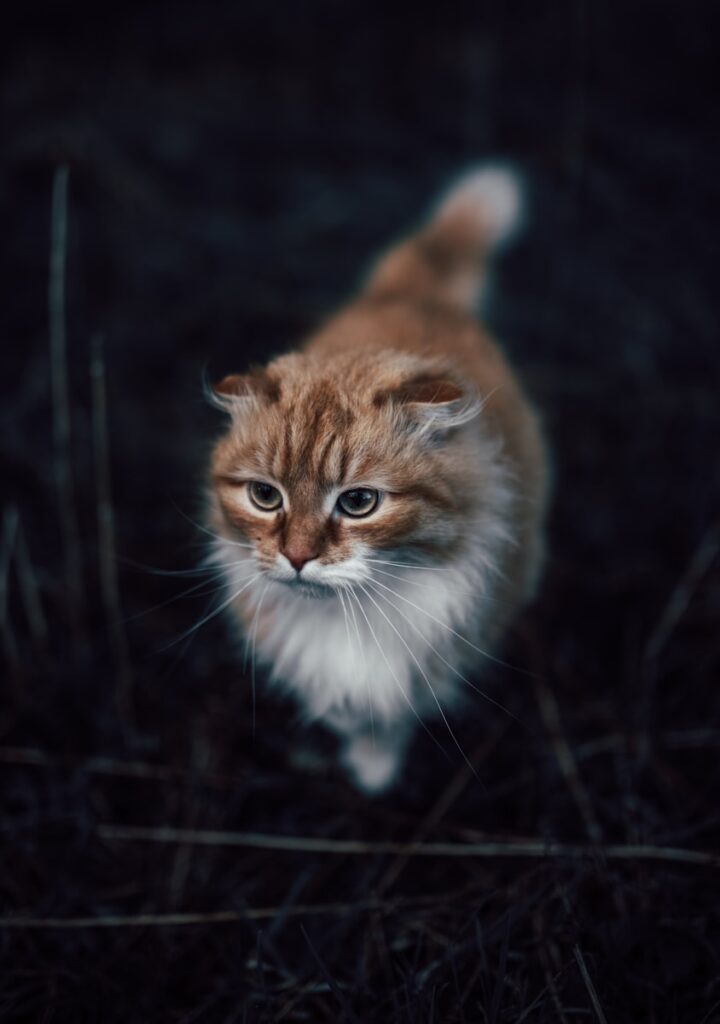
Photo by Vadim Sadovski on Unsplash
Understanding the Munchkin Cat Breed
The Munchkin cat breed gained recognition through careful breeding programs that focused on the genetic mutation responsible for their short legs. The International Cat Association first acknowledged Munchkins in the 1990s, though the Cat Fanciers Association has not granted them championship status due to ongoing health debates.
These cats come in both short hair and long haired varieties, with coat colors spanning the full spectrum found in other breeds. Adult cats typically weigh between 5-9 pounds, with females generally smaller than males. Their compact legs don’t prevent them from running, playing, or climbing, though they may not jump as high as other cats.
Munchkins display dog-like behaviors, often following their owners around the house and responding well to training. Their curious and playful nature makes them excellent companions for families with children and other pets. Unlike some cat breeds that remain aloof, Munchkins actively seek human interaction and enjoy being part of household activities.
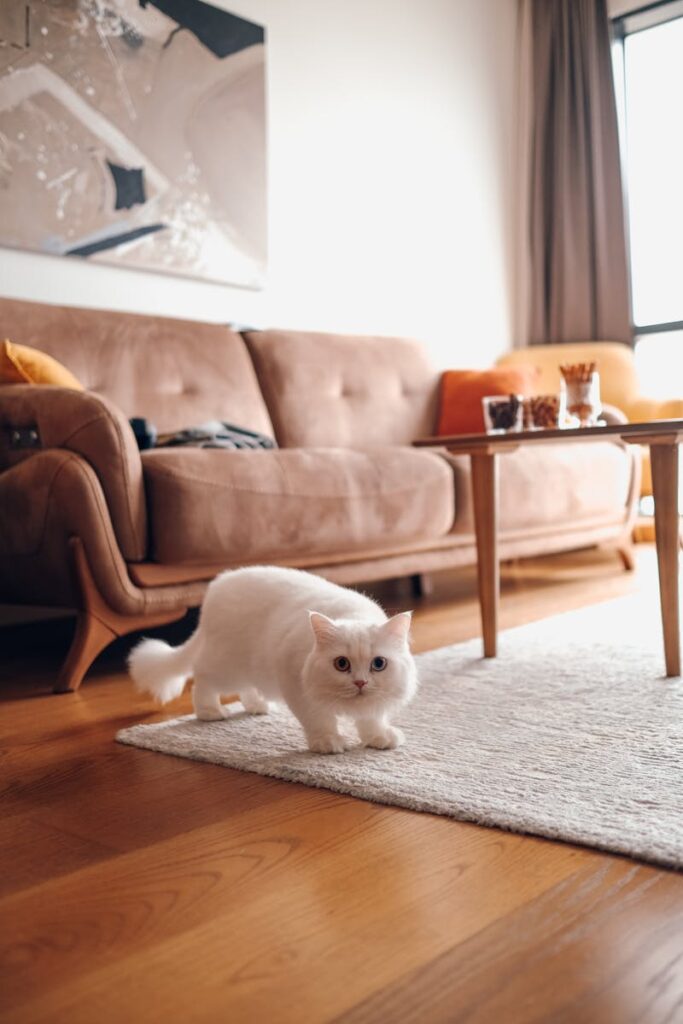
Photo by Tahir Osman on Pexels
Setting Up Your Home for a Munchkin Cat Care
Creating a Munchkin-friendly environment requires thoughtful adjustments around the house. Since these cats have shorter legs, they benefit from strategically placed steps or ramps leading to favorite perches. Low litter boxes work better than high-sided models, ensuring easy access for your kitten throughout their life.
Food and water bowls should sit at comfortable heights to prevent neck strain during meals. Elevated feeders designed for small dogs often work perfectly for adult cats of this breed. Fresh water should always be available, preferably in multiple locations throughout your home.
Toys need careful selection for Munchkin kittens. Choose items appropriate for their size and leg length, avoiding toys that require excessive jumping or stretching. Interactive puzzle feeders, feather wands, and small balls provide excellent entertainment while accommodating their physical characteristics.
Safety considerations become particularly important with multiple cats in the household. Ensure your Munchkin kitten can access hiding spots and high areas where they feel secure, even if they need assistance reaching these locations.
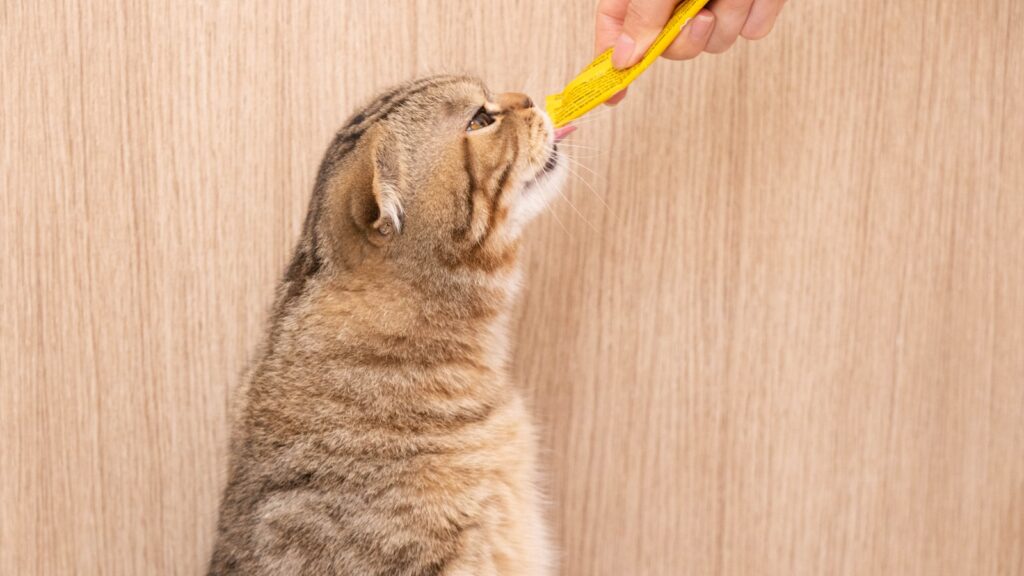
Photo by Đồng Phục Hải Triều on Unsplash
Feeding Your Munchkin Kitten Properly
A Munchkin kitten’s diet follows the same nutritional principles as other breeds, but portion control becomes crucial for preventing weight gain that could stress their joints. High-quality kitten food provides the protein and nutrients necessary for proper development during their first year.
Wet food offers several advantages for Munchkin kittens, including increased moisture content and easier digestion. Many veterinarians recommend a combination of wet and dry food to ensure balanced nutrition while promoting dental health. Feed your kitten like you would any other breed, adjusting portions based on their individual growth rate and activity level.
Establish regular feeding schedules rather than free-feeding to monitor your cat’s diet more effectively. Most kittens require three to four meals daily until six months old, then transition to twice-daily feeding. Monitor your kitten’s weight regularly, as excess pounds can contribute to spinal problems and mobility issues later in life.
Avoid feeding table scraps or foods toxic to cats, including chocolate, onions, and grapes. Stick to veterinarian-approved treats in moderation to prevent unwanted weight gain that could impact your cat’s quality of life.
Grooming Requirements for Munchkin Cats
Grooming needs vary between short hair and long haired Munchkins, but both varieties benefit from regular maintenance. Short-haired cats need brushed weekly to remove loose fur and distribute natural oils throughout their coat. Long-haired varieties require brushing your cat regularly to prevent matting and reduce shedding around the house.
Regular teeth cleaning helps prevent dental disease, which affects most cats regardless of breed. Start dental care early with your kitten, using cat-specific toothpaste and brushes. Many Munchkins tolerate dental care well due to their generally cooperative nature.
Nail trimming should occur every two weeks to prevent overgrowth and protect furniture. Since Munchkin cats may not scratch as vigorously as other breeds due to their leg length, regular maintenance becomes even more important for their comfort and health.
Ear cleaning and eye care follow standard feline protocols. Check ears weekly for wax buildup or signs of infection, and gently clean the eye area to remove any discharge that could cause staining or irritation.
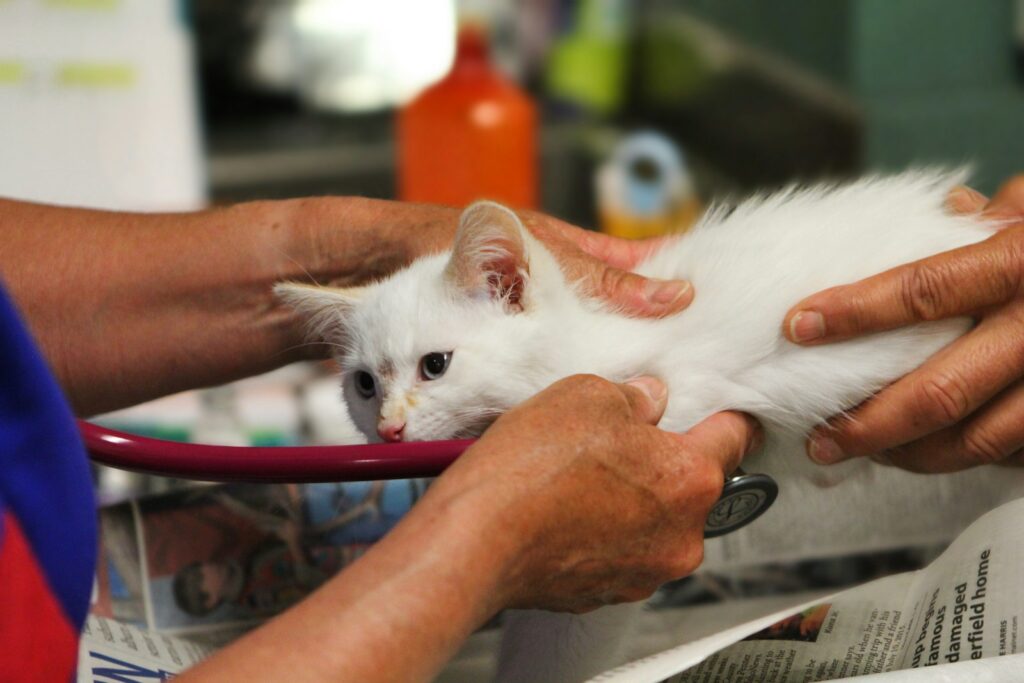
Photo by Judy Beth Morris on Unsplash
Health Considerations and Veterinary Care
While Munchkin cats generally enjoy good health, their unique body structure requires attention to specific health concerns. Spinal problems represent the primary worry among veterinarians and breed critics, though severe cases remain relatively uncommon when cats come from reputable breeders.
Schedule regular veterinary checkups to monitor your cat’s spine, joints, and overall mobility. Early detection of potential issues allows for preventive care that can significantly improve your cat’s quality of life. Your veterinarian may recommend specific exercises or weight management strategies based on your individual cat’s needs.
Watch for signs that might indicate developing problems, including difficulty moving, reluctance to play, or changes in gait. While congenital defects occur in all breeds, staying vigilant helps ensure prompt treatment when issues arise.
Maintain standard vaccination schedules and parasite prevention protocols recommended for other cats. Munchkin cats don’t require special medications or treatments beyond what veterinary medicine typically prescribes for feline patients.
Exercise and Enrichment Activities
Munchkin kittens need regular exercise to maintain healthy weight and muscle tone, though their activity requirements differ slightly from other breeds. These cats excel at ground-level play and enjoy toys that encourage stalking, pouncing, and batting behaviors.
Create vertical spaces with ramps or steps to help your kitten access different levels safely. Cat trees designed with shorter platforms work better than tall structures with wide gaps between perches. This accommodation allows your Munchkin to satisfy their natural climbing instincts without strain.
Interactive play sessions help burn energy while strengthening the bond between you and your kitten. Use feather wands, laser pointers, and small toys to encourage movement and mental stimulation. Most cats enjoy puzzle feeders that combine mealtime with problem-solving activities.
Rotate toys regularly to maintain your kitten’s interest and prevent boredom. Munchkin cats often display heightened curiosity compared to other animals, making environmental enrichment particularly important for their psychological well-being.
Socialization with Other Pets and Humans
Munchkin kittens typically socialize well with other pets when introduced properly. Their friendly, adaptable nature helps them integrate into households with dogs and other cats. However, supervise initial interactions carefully to ensure larger animals don’t accidentally harm your kitten during play.
These cats often develop strong bonds with their human family members, sometimes displaying attachment behaviors similar to dogs. Early socialization with various people, sounds, and experiences helps create confident, well-adjusted adult cats.
When introducing your Munchkin kitten to existing pets, follow gradual introduction protocols recommended by animal behaviorists. Allow each animal to adjust at their own pace, providing separate spaces and resources until everyone feels comfortable sharing territory.
Munchkin cats generally adapt well to households with children, though supervision remains important during interactions between young kids and kittens. Teaching children appropriate handling techniques protects both the kitten and the child while fostering positive relationships.
Choosing a Reputable Breeder
Finding a responsible breeder becomes crucial when acquiring a Munchkin kitten, as ethical breeding practices significantly impact long-term health outcomes. Research breeders who health test their breeding cats and provide documentation of genetic screening for common issues.
The average price for Munchkin kittens varies widely based on location, breeder reputation, and coat characteristics. Expect to pay more for cats from established breeders who invest in proper health testing and socialization. Remember that initial costs pale compared to potential veterinary expenses from poorly bred animals.
Visit the breeder’s facility if possible to observe the conditions where kittens are raised. Reputable breeders welcome questions about their breeding program, health testing protocols, and the specific lineage of available kittens. They should provide health guarantees and ongoing support for new owners.
Avoid puppy mills or backyard breeders who cannot provide health clearances for parent cats. These operations often prioritize profit over animal welfare, potentially resulting in kittens with serious health problems that become apparent only after purchase.
Creating Long-Term Care Plans
Munchkin cats typically live 12-15 years with proper care, making long-term planning essential for their well-being. Establish relationships with veterinary professionals experienced in treating this breed, as they may offer insights specific to short-legged cats.
Consider pet insurance early in your kitten’s life, as pre-existing conditions often face coverage exclusions. Some policies specifically cover genetic conditions that might affect Munchkin cats, providing financial protection for unexpected health issues.
Budget for ongoing expenses including high-quality food, regular veterinary care, grooming supplies, and environmental modifications that may become necessary as your cat ages. Senior Munchkin cats might need additional accommodations to maintain mobility and comfort.
Keep detailed health records throughout your cat’s life, noting any changes in behavior, appetite, or mobility. This documentation helps veterinarians identify patterns and make informed treatment decisions if health concerns develop.
At Kate’s K9 Pet Care, we understand that every pet deserves personalized and exceptional care. Whether you’re at work, on vacation, or simply need extra help, our experienced team is dedicated to providing pet care services tailored to meet your needs. From routine dog walking and exercise to pet taxi and pet supply delivery, we ensure that your furry friend is happy, healthy, and loved while you’re away. Trust Kate’s K9 Pet Care to treat your pets as family, delivering peace of mind and reliable service whenever you need it. Please read the disclaimer at the beginning of the blog for information about the specific services we offer!

Ensuring Your Munchkin’s Happiness and Health
Munchkin kitten care requires attention to their unique physical characteristics while maintaining the same love and commitment given to any feline companion. These remarkable cats bring joy to families willing to accommodate their special needs and provide appropriate care throughout their lives.
Success with Munchkin ownership comes from understanding both their limitations and capabilities. While they may not jump as high as a normal cat breed, they compensate with personality, affection, and adaptability that makes them wonderful additions to the right households.
Start implementing these care guidelines immediately with your new kitten to establish healthy routines that will benefit them throughout their lives. Remember that every cat is an individual, so adjust care recommendations based on your specific pet’s needs and your veterinarian’s advice. With proper care, your Munchkin kitten will develop into a healthy, happy companion that brings years of joy to your family.
